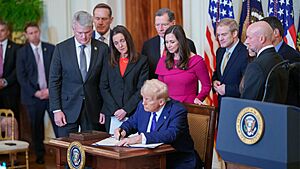Laken Riley Act facts for kids
 |
|
| Long title | A law about holding non-citizens who are accused of certain crimes like theft. |
|---|---|
| Citations | |
| Public law | Pub.L. 119-1 |
| Codification | |
| Acts amended | Immigration and Nationality Act of 1952 |
| Titles amended | 8 U.S.C.: Aliens and Nationality |
| U.S.C. sections amended | 8 U.S.C. ch. 12, subch. II § 1182(d)(f) 8 U.S.C. ch. 12, subch. II § 1225(b) 8 U.S.C. ch. 12, subch. II § 1226 8 U.S.C. ch. 12, subch. II § 1226(c) 8 U.S.C. ch. 12, subch. II § 1231(a)(2) 8 U.S.C. ch. 12, subch. II § 1252(f) 8 U.S.C. ch. 12, subch. II § 1253 |
| Legislative history | |
|
|
The Laken Riley Act is a law in the United States. It requires the government to hold non-citizens who are accused of certain crimes, such as theft. A non-citizen is someone who is not a citizen of the country they are in.
This means that if a non-citizen is charged with one of these crimes, they must be kept in custody by immigration officials. They cannot be released on bail. The law also allows states to take legal action against the U.S. government if they feel it is not enforcing immigration laws correctly.
The law was named after Laken Riley, a student who tragically lost her life. It was passed by the U.S. Congress and signed into law by President Donald Trump on January 29, 2025.
Contents
Why Was the Law Created?
The idea for this law came after the tragic death of Laken Riley in Georgia on February 22, 2024. The person accused in her death was a man from Venezuela. He had entered the United States without official permission in 2022.
Before this event, the man had been stopped by police for other reasons, including a traffic violation and for shoplifting. He was released by local officials after these earlier incidents.
This situation caused a lot of discussion among politicians and the public. Many people felt that the rules for immigration needed to be stricter. This led a member of Congress, Mike Collins, to propose a new bill named the Laken Riley Act.
What Does the Law Do?
The Laken Riley Act changes the rules for when non-citizens must be held by the government. This is also called being "detained."
New Rules for Detention
The law requires the Department of Homeland Security to detain any non-citizen who is accused of certain crimes. This includes being:
- Charged with a crime
- Arrested for a crime
- Found guilty of a crime
- Admitting to committing a crime
The types of crimes include taking things that don't belong to you (like burglary or theft), hurting a law enforcement officer, or any crime that causes serious injury or death to another person.
An important part of this law is that it applies to people who are only accused of a crime. They do not have to be found guilty in a court of law for this rule to apply.
Changes to Previous Laws
Before the Laken Riley Act, the government was already required to detain non-citizens who had committed very serious crimes. The new law expanded this list to include more types of crimes, like theft.
The final version of the law also included two additions, called amendments. One requires detaining non-citizens accused of hurting a police officer. The other, nicknamed "Sarah's Law," requires detaining those accused of a crime that results in death or serious injury, such as from unsafe driving.
Power for States
The act also gives states the power to take the federal government to court. A state can do this if it believes the government is not following the new rules about detaining and removing non-citizens.
How Did It Become a Law?
A proposed law is called a bill. For a bill to become a law, it must be approved by both parts of the U.S. Congress: the House of Representatives and the Senate. Then, the President must sign it.
The Laken Riley Act was first introduced in 2024 but did not pass the Senate that year. In 2025, it was introduced again. It passed the House of Representatives with a vote of 264–159. Members of both the Republican and Democratic parties voted for it.
The Senate then debated the bill and added the amendments about hurting a police officer and unsafe driving. The Senate passed the changed bill with a vote of 64–35.
Because the Senate changed the bill, it had to go back to the House of Representatives for another vote. The House approved the Senate's version. Finally, President Donald Trump signed the bill on January 29, 2025, making it an official law.
| Congress | Short title | Bill numbers | Date introduced | Sponsors | # of cosponsors | Latest status |
|---|---|---|---|---|---|---|
| 118th Congress | Laken Riley Act | H.R. 7511 | March 1, 2024 | Mike Collins (R–GA) | 78 | Passed House |
| 119th Congress | H.R. 29 | January 3, 2025 | 54 | Passed House | ||
| S. 5 | January 6, 2025 | Katie Britt (R–AL) | 53 | Signed into law |
Different Views on the Law
Like many laws, people had different opinions about the Laken Riley Act.
Support for the Act
Groups that supported the bill, like the Federation for American Immigration Reform, said it would make the country safer. They believed that detaining non-citizens accused of crimes would prevent other bad things from happening. Laken Riley's mother, Allyson Phillips, said she was grateful the law was passed.
Opposition to the Act
Many other groups, including the American Civil Liberties Union (ACLU) and the NAACP Legal Defense and Educational Fund, opposed the bill. These groups, along with others focused on civil rights and social justice, were worried about the law's fairness.
The main concern of critics was that the law punishes people who have only been charged with a crime, not convicted. In the U.S. legal system, a person is considered innocent until proven guilty. Critics argued that this law could harm people who might later be found innocent.
See also
- List of United States immigration laws
- Illegal immigration to the United States and crime
- Habeas corpus in the United States
- Deportation in the second presidency of Donald Trump
- Revolving Door (advertisement)
 | Mary Eliza Mahoney |
 | Susie King Taylor |
 | Ida Gray |
 | Eliza Ann Grier |


